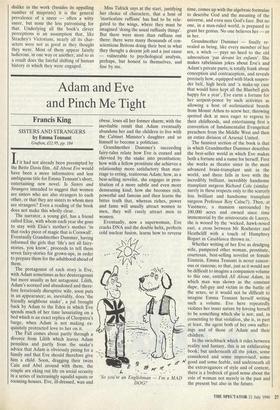Adam and Eve and Pinch Me Tight
Francis King
SISTERS AND STRANGERS by Emma Tennant Grafton, f12.95, pp. 184 If it had not already been preempted by the Bette Davis film, All About Eve would have been a more informative and less ambiguous title for Emma Tennant's short, entertaining new novel. Is Sisters and Strangers intended to suggest that women are sisters who are also strangers to each other, or that they are sisters to whom men are strangers? Even a reading of the book does not make this wholly clear.
The narrator, a young girl, has a friend called Elsie, with whom each year she goes to stay with Elsie's mother's mother 'in that rocky piece of magic that is Cornwall'. Eventually Grandmother Dummer, having informed the girls that life's not all fairy- stories, you know', proceeds to tell them seven fairy-stories for grown-ups, in order to prepare them for the adulthood ahead of them.
The protagonist of each story is Eve, with Adam sometimes as her deuteragonist but more usually as her antagonist. Lilith, Adam's scorned and abandoned and there- fore ferociously disruptive wife, soon puts in an appearance; as, inevitably, does 'the friendly neighbour snake', a pal brought back by Adam to the Eden in which Eve spends much of her time luxuriating on a bed which is an exact replica of Cleopatra's barge, when Adam is not making ex- quisitely protracted love to her on it.
The Fall comes about partly through a divorce from Lilith which leaves Adam penniless and partly from the snake's advice that Adam is obviously pining for a family and that Eve should therefore give him a child. Soon, dragging their twins Cain and Abel around with them, the couple are eking out life on social security in a series of increasingly squalid squats or rooming-houses. Eve, ill-dressed, wan and obese, loses all her former charm; with the inevitable result that Adam eventually abandons her and the children to live with the Cabinet Minister's daughter and so himself to become a politician.
Grandmother Dummer's succeeding fairy-tales relate how Eve is coaxed and chivvied by the snake into prostitution; how with a fellow prostitute she achieves a relationship more satisfactory than mar- riage to erring, traitorous Adam; how, as a best-selling novelist, she engages in pros- titution of a more subtle and even more demeaning kind; how she becomes rich, powerful and famous and then learns the bitter truth that, whereas riches, power and fame will usually attract women to men, they will rarely attract men to women.
Eventually, now a superwoman, Eve cracks DNA and the double helix, perfects cold nuclear fusion, learns how to reverse 'So you're an Englishman — I'm a MAD DOG!' time, comes up with the algebraic formulae to describe God and the meaning of the universe, and even sees God's face. But no one, in a man-ruled world, is prepared to grant her genius. No one believes her — or in her.
Grandmother Dummer — finally re- vealed as being, like every member of her sex, a witch — pays no heed to the old admonition 'pas devant les enfants'. She makes rabelaisian jokes about Eve's and Adam's private parts, is totally frank about conception and contraception, and reveals precisely how, equipped with black suspen- der belt, high heels and 'a make-up case that would have kept all the Bluebell girls happy for a year', Eve earns a fortune for 'her serpent-ponce by such activities as allowing a host of ecclesiastical beards from Mount Athos to screw her, throwing spotted dick at men eager to regress to their childhoods, and entertaining first a convention of fundamentalist Evangelical preachers from the Middle West and then an entire division of Arsenal United.
The funniest section of the book is that in which Grandmother Dummer describes the best-seller world in which Eve makes both a fortune and a name for herself. First she works as theatre sister in the most advanced brain-transplant unit in the world, and there falls in love with the ' incredibly brilliant, incredibly handsome transplant surgeon Richard Cole (similar surely in these respects only to the scarcely less brilliant and handsome transplant surgeon Professor Roy Caine?). Then, at Vastmere, a mansion surrounded by 100,000 acres and owned since time immemorial by the aristrocratic de Laceys, she is wooed by the 'wicked, hawk-nosed earl, a cross between Mr Rochester and Heathcliff with a touch of Humphrey Bogart in Casablanca thrown in.'
Whether writing of her Eve as drudging wife, pampered other woman, prostitute, courtesan, best-selling novelist or female Einstein, Emma Tennant is never rancor- ous or raucous; so that, just as it would not be difficult to imagine a companion volume to this one, entitled All About Adam, in which man was shown as the constant dupe, fall-guy and victim in the battle of the sexes, so it would not be difficult to imagine Emma Tennant herself writing such a volume. Eve here repeatedly violates her inner nature by forcing herself to be something which she is not; and, in consenting to that violation, she is, in part at least, the agent both of her own suffer- ings and of those of Adam and their children.
In the switchback which it rides between reality and fantasy, this is an exhilarating book; but underneath all the jokes, some considered and some improvised, some A/ good and some feeble, and underneath all the extravagances of style and of content, there is a bedrock of good sense about the role of woman not merely in the past and the present but also in the future.


















































 Previous page
Previous page